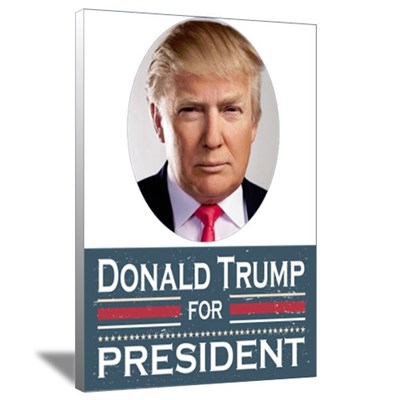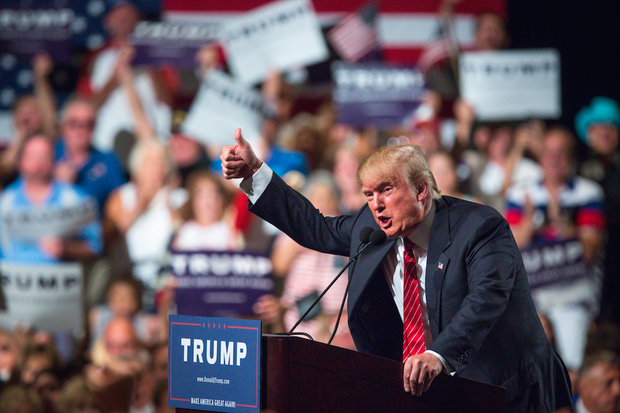World News – Donald Trump’s surge in the Republican primary is being helped by an unlikely ally: the press.
 With 16 Republican candidates running for president, most contenders are struggling to get media coverage, which helps make them better-known to voters and spread their message. That hasn’t been a problem for Trump.
With 16 Republican candidates running for president, most contenders are struggling to get media coverage, which helps make them better-known to voters and spread their message. That hasn’t been a problem for Trump.
Data provided by Google to the journalism site FiveThirtyEight found that 46 percent of the media coverage over the last month about the GOP candidates was about Trump, as measured by articles that appeared in Google News. That’s compared to 13 percent of articles about Jeb Bush, who got the second-most attention.
Trump, in a period from June 14 to July 12, received more coverage than the combined total of Bush, Wisconsin Gov. Scott Walker and Florida Sen. Marco Rubio, generally considered the three leading GOP candidates, according to Google.
Two political scientists, using another data set, estimated Trump has gotten about 21 percent of the GOP coverage since he announced his candidacy on June 16. John Sides and Lynn Vavreck, the political scientists, say Bush has received about 20 percent of coverage, similar to Trump. But the other candidates trail badly in terms of media attention. (NBC has covered Trump extensively as well, airing two stories about him on Monday’s “Nightly News.” There was no story of a major policy address Jeb Bush delivered that same day.)
“No one wakes up on June 17 and randomly decides on their own that Donald Trump should be the Republican nominee for president. People’s minds change because they are hearing information that they haven’t heard before. In this case, people are being bombarded with news stories about Trump,” Sides wrote in a piece published by the Washington Post.
Other Republican candidates have noticed the Trump coverage, and some of them are frustrated by it.
“It could be the free billion dollars of publicity he has gotten by being on every channel all the time,” said Kentucky senator and GOP 2016 candidate Rand Paul, when asked Tuesday on Fox News about Trump’s surge.
He added, “I think if I could just get a billion dollars’ worth of free TV, I think we maybe we’d get the same kind of surge.”
The rise of Trump has created a great debate within the media on how to cover him. In the competition for the viewers and web traffic that help media outlets make money, Trump coverage makes sense. And by a number of measures, the publicly is deeply interested in Trump.
For example, NBC’s online coverage of Trump’s controversial comments on Sen. John McCain over the weekend were seen and shared by readers three times as much as that of Walker’s announcement of his presidential run last week. The data Google provided to FiveThirtyEight showed that 62 percent of Google searches from the public about the GOP candidates were about Trump, more than all of the party’s other hopefuls combined.
Facebook estimates that there were about 6.4 million “interactions” (generally measured as posts, likes, shares, comments) in the 24 hours around Trump’s announcement, more than any other candidate except Hillary Clinton, who generated 10.1 million.
And by one measure, Trump is one of the leading candidates: polls. A new Washington Post/ABC News survey showed Trump getting 24% of the vote  in the Republican field, 11 points ahead of Walker, who was in second.
in the Republican field, 11 points ahead of Walker, who was in second.
But national polls are very flawed predictors of election results, as Herman Cain lead them in 2011 and didn’t win a single primary. And they tend to reflect media coverage, particularly in a crowded field. A study by Sides and Vavreck of the 2012 campaign found that Cain, former Texas Gov. Rick Perry and former House Speaker Newt Gingrich all surged in 2011 after getting a disproportionate amount of press attention, then faded as that coverage either went away or turned from favorable to more negative.
(It’s not clear if Trump is following this pattern exactly, as much of the coverage of Trump has already been negative, focused on controversial remarks he made during his announcement speech.)
“National numbers mean nothing,” Pennsylvania Sen. Rick Santorum said in an interview yesterday, noting he had won the Iowa caucuses in 2012 despite been far behind other hopefuls in national surveys.
Most election experts say Trump has almost no chance to win, arguing his non-traditional background (he has never served in elective office) and unpopularity with GOP elites (research shows winners of presidential primaries are often those who get endorsements from senators, governors and other key party leaders) would eventually kill his candidacy.
Some journalists say Trump’s candidacy is not serious in terms of exploring major issues either, unlike Vermont Sen. Bernie Sanders, another long shot candidate but one who has offered a number of detailed policy ideas on addressing income inequality.
“After watching and listening to Donald Trump since he announced his candidacy for president, we have decided we won’t report on Trump’s campaign as part of The Huffington Post’s political coverage,” top editors at The Huffington Post wrote last week. “Instead, we will cover his campaign as part of our Entertainment section. Our reason is simple: Trump’s campaign is a sideshow. We won’t take the bait. If you are interested in what The Donald has to say, you’ll find it next to our stories on the Kardashians and The Bachelorette.”
Jay Rosen, a journalism professor at New York University, defended The Huffington Post move.
“What is the logic of this candidacy? Who is a serious candidate for president? Who is not capable? These are exactly the assessments editors and reporters have to be making as they review the field and decide how to ‘spend’ scarce coverage units,” he wrote. “They’re not deciding who we vote for. They’re deciding how best to render the field. Who is a serious foreign policy candidate? Who has proposals for addressing inequality that are worthy of more discussion? Campaign journalists should be able to tell us.”
The Donald though may have one trump card: he is good at making outlandish comments that journalists will be tempted to cover and that will generate high levels of controversy.
Many of the candidates in both parties are delivering detailed policy addresses of how they would govern as president. But their speeches are often either unsurprising (most of Hillary Clinton’s ideas mirror those of President Obama and other Democrats) or unrealistic (Bush proposed an amendment to the U.S. Constitution on Monday mandating a balanced budget. Only 17 constitutional amendments have passed since 1790).
The media tends not to cover these ideas in great detail, even if these are offering previews of the policies of the next American president.
Trump, in questioning McCain’s heroism, suggesting Mexico is sending “rapists” to the U.S. and that he could build a wall that would stop nearly all border crossings from Mexico to the U.S., seems to understand very well how American media works and is playing that to his advantage. A very famous person like Trump saying highly controversial things seems difficult for the media to ignore.
This is not new for Trump: he essentially forced the sitting president of the United States to release his birth certificate four years ago.
by PERRY BACON JR., NBCNews.com

